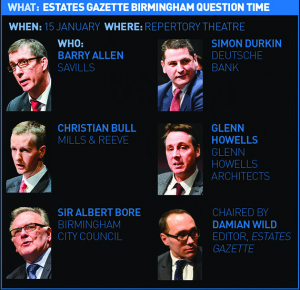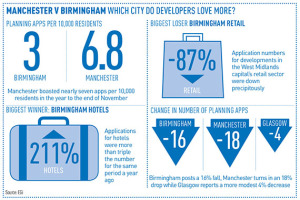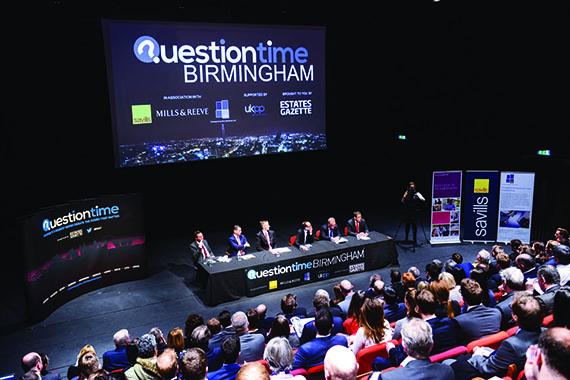Estates Gazette kicked off 2015 with its first Question Time event of the year held in the UK’s second city – and its most investable, according to the latest research from the Urban Land Institute. Some 230 guests, including developers, advisers and council representatives, braved the bitter cold and packed into Birmingham’s revamped Repertory Theatre in Centenary Square for more than two hours of fervent debate.
A top subject for discussion for the six-strong panel was the private rented sector. Birmingham city council was the first local authority in the UK to set up a dedicated company to develop PRS housing. Council leader Sir Albert Bore confirmed that the council was progressing with its 92-flat scheme on St Vincent Street, close to the National Indoor Arena. He said: “The city council is enthusiastic in ensuring that PRS is part of the spectrum of projects in Birmingham. We think it will demonstrate to the private sector that PRS can work here.”
Other panellists were divided. Savills director Barry Allen talked of a “significant appetite for prime locations for UK and overseas funds to deliver PRS,” with Birmingham well-placed to take advantage of this. However, fellow panellist Simon Durkin of Deutsche Bank suggested that larger investors were unlikely to back the sector until it matured. “Our average lot size is £40m-£100m. That’s very difficult to achieve in an emerging asset class,” said Durkin.

Panellists were asked whether a stronger regional identity – such as the locally controversial “Greater Birmingham” moniker – would help to attract more international investment. Bore responded that the region had to “grow up” and use the Birmingham name. “Greater Manchester has used its name for a long while now and I think it assists not just Manchester but the other local authorities too. We need to understand that internationally, there are certain geographical locations that are known. Calling the region ‘greater Birmingham’ would get better recognition from investors, especially internationally.”
Durkin agreed that a greater regional identity would help his firm sell Birmingham to its clients.
As at all EG Question Time events the audience was invited to voice its own concerns to the panel. Top of the list was the potential impact of proposed public sector spending cuts on development. Glenn Howells, of Glenn Howells Architects, said he saw the cuts as a significant problem for a city facing a “tidal wave of development”.
He added that a range of different tools should be applied such as planning performance initiatives to secure the right resources for the job. Asked if there was a willingness among developers to pay extra to get the right planning resources, Howells said: “Absolutely, yes, for a modest additional fee. This would be a great advantage.”

It would have been impossible to round off the event without touching on the political hot potato of High Speed Rail. The panel was asked if the £50bn HS2 project would have a significant effect on the city’s office rents. Panellist Christian Bull, real estate partner at law firm Mills & Reeve, said it would have a “huge effect”. In particular, he believed, rents would rise.
As a direct response to HS2 and the city’s lack of high-quality space, Bore noted that, for the first time in years, people were ready to invest on a speculative basis. However, Deutsche Bank’s Durkin suggested that it was more important for firms to look at a city’s employment talent pool and availability of product rather than office rental costs. Birmingham, he pointed out, competes not only with other UK cities, but also with Hamburg, Paris, Nordic cities and parts of eastern Europe.
How will the general election affect investment in Birmingham?
Barry Allen: The election won’t derail Birmingham. Before the election it will be a distraction. If Labour wins, we’ll predictably see more short-term investment here.
Simon Durkin: There will be no significant long-term impact. Infrastructure investment is absolutely key.
Glen Howells: The city’s performance does not depend on Westminster, but if no government wins a clear mandate, that is a concern.
Christian Bull: Devolution is on the agenda whichever party wins.
Sir Albert Bore: The UK needs to maintain growth in Birmingham.
For more highlights from the Birmingham Question Time debate, click on the video below












